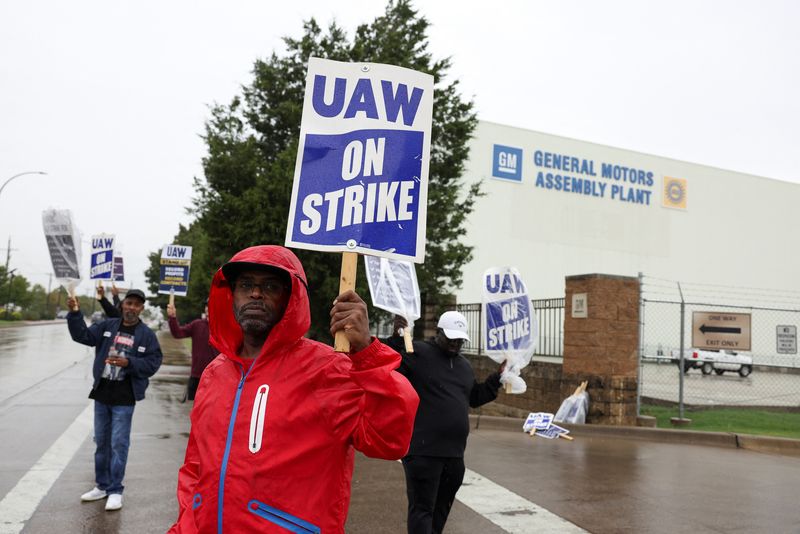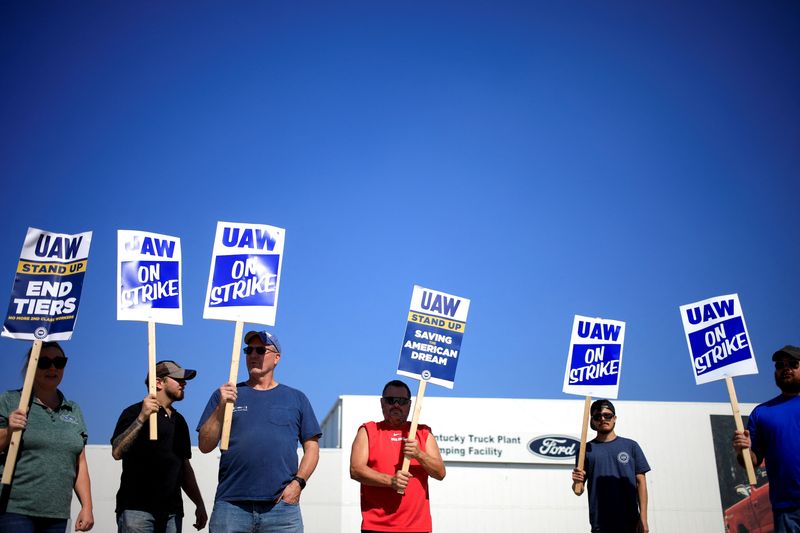By David Shepardson and Joseph White
(Reuters) -The United Auto Workers (UAW) union on Tuesday struck a General Motors (NYSE:GM) assembly plant in Texas that builds the U.S. automaker's profitable full-size sport utility vehicles in another significant expansion of the strike.
By striking GM's Arlington assembly plant, home to GM's profitable Chevy Tahoe, Chevy Suburban, GMC Yukon and Cadillac Escalade large SUVs, the UAW has now shut down three of the most profitable auto factories in the world. Workers at Ford (NYSE:F)'s Kentucky Truck heavy-duty pickup factory and Chrysler-owner Stellantis (NYSE:STLA)' Ram pickup plant in Sterling Heights, Michigan, are already on picket lines.
The Arlington walkout doubles the weekly cost of the union dispute to $400 million, GM said in a filing Tuesday afternoon. Previously, the automaker had said strikes were costing it $200 million a week.
"We are disappointed by the escalation of this unnecessary and irresponsible strike," GM said in a statement on Tuesday.
Meanwhile, bargaining continues at all three automakers. The UAW has given Stellantis a new contract proposal and is expected to deliver a counteroffer to GM soon, a person familiar with the process said. Union bargainers are waiting for a new offer from Ford and are in discussions with company negotiators. Ford has said its most recent offer was "at the limit" of what it could afford and remain competitive.
The union's strategy of targeted strikes unfolded over 40 days has throttled billions in revenue for the Detroit Three automakers while requiring fewer than half the 150,000 UAW members at the companies to forgo pay and walk picket lines. It also has rippled out, causing businesses ranging from airlines to auto parts makers to start feeling the heat.
GM earlier on Tuesday reported a stronger-than-expected third-quarter profit but withdrew its full-year financial forecast due to the uncertainty of the strike.
"Another record quarter, another record year. As we've said for months: record profits equal record contracts," UAW President Shawn Fain said. "It's time GM workers, and the whole working class, get their fair share."
On Friday, Fain indicated that a settlement could be near but that negotiations could get tougher, calling talks before a deal "the hardest part of a strike."
It is not clear how far apart the union and the automakers are. Fain on Friday said the Detroit Three had converged on a 23% wage hike offer and made progress on other issues.
But Fain told UAW members "there is more to be won." GM and Ford had said additional cost-of-living increases already take their total compensation offers to over 30%.
Fain's decision to push the Detroit Three for even more than the record wage and benefit packages they have offered is a gamble that the automakers will dig deeper into future dividends, share buybacks or capital spending budgets to improve UAW wages and benefits. So far, none of the automakers has declared a formal impasse. But the companies have not ruled it out.
The hit to Detroit Three profits also could mean smaller profit sharing checks for UAW workers at the end of the year. In fiscal 2019, GM's fourth-quarter profit took a $3.6 billion hit from a 40-day UAW strike that idled all the automaker's U.S. factories.
GM CEO Mary Barra told investors on Tuesday that the company "will not agree to a contract that isn't responsible to our employees and our shareholders."
Company executives have said they are increasingly concerned about small and medium-sized suppliers that could run into financial distress if the UAW walkouts slash their cash flow. Even larger suppliers, including Corning (NYSE:GLW) and Illinois Tool Works (NYSE:ITW), are warning that Detroit's labor clash will hurt their finances.
Thousands of UAW workers at supplier operations within the automakers are being affected. Stellantis on Tuesday laid off 525 workers at a factory that supplies the Ram truck plant that is now on strike.
After five week of strikes, the economic losses for the auto industry had crossed $9.3 billion, Anderson Economic Group LLC estimated on Monday.
Wells Fargo estimated the UAW strike fund will still be $750 million by the end of this week. UAW officials declined to identify the fund's size.
The UAW and the automakers are also bargaining over future wages and unionization policies for electric vehicle battery plants planned by joint ventures of the automakers and their South Korean battery partners.
Those talks are complicated, because the ventures are separate companies and the automakers do not have to cover them under their master UAW contracts under U.S. labor law.

Shares in GM, Ford and Stellantis were little changed on Tuesday, reflecting Wall Street's view that the UAW talks may be entering the end game.
"The union is playing its cards with the goal of a settlement sooner rather than later," University of California, Berkeley labor professor Harley Shaiken said. "Pulling out the profitable plants is meant to hasten the settlement."
